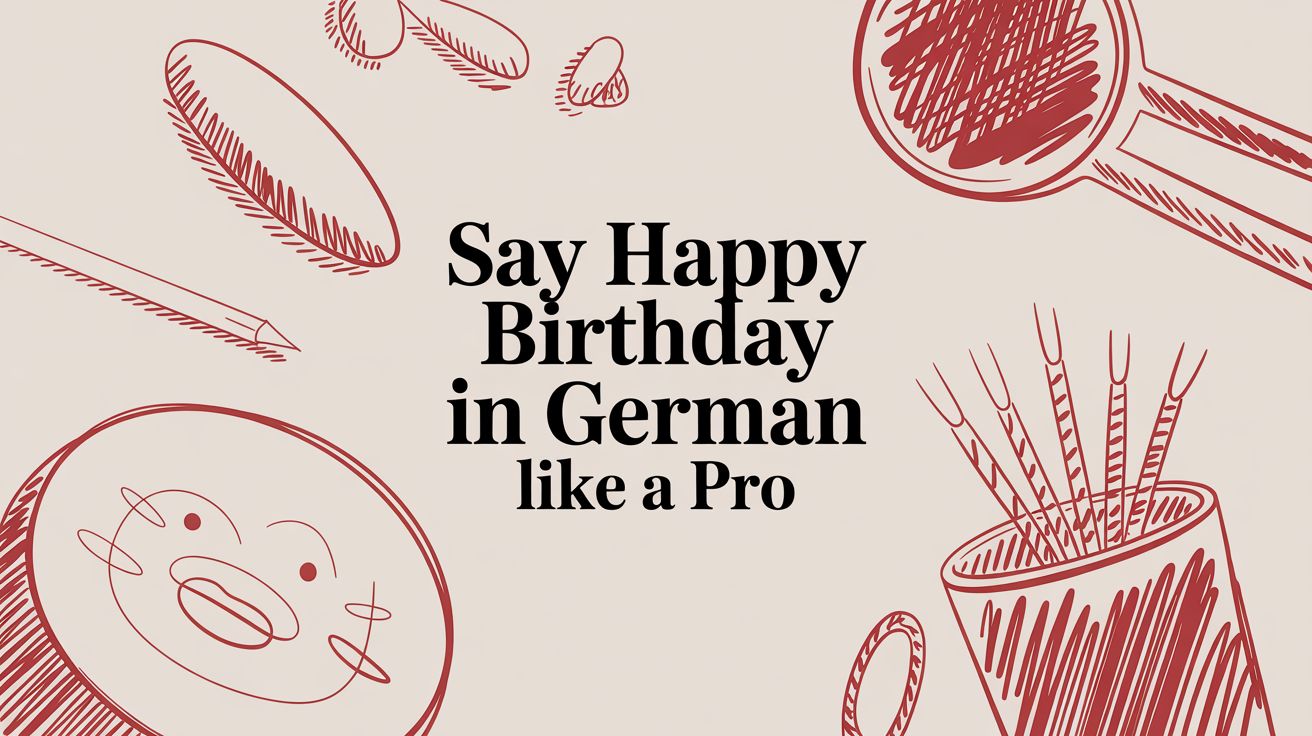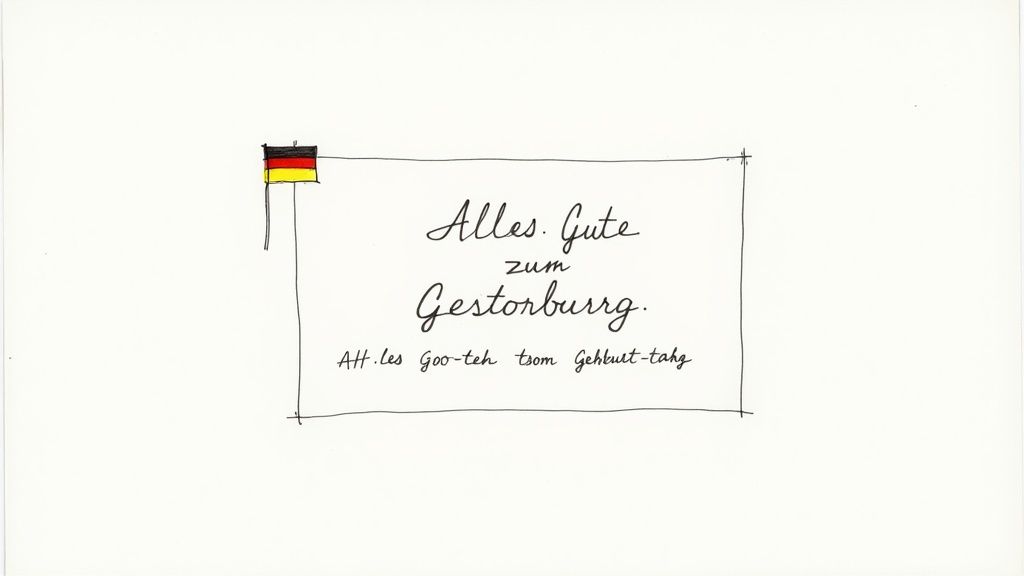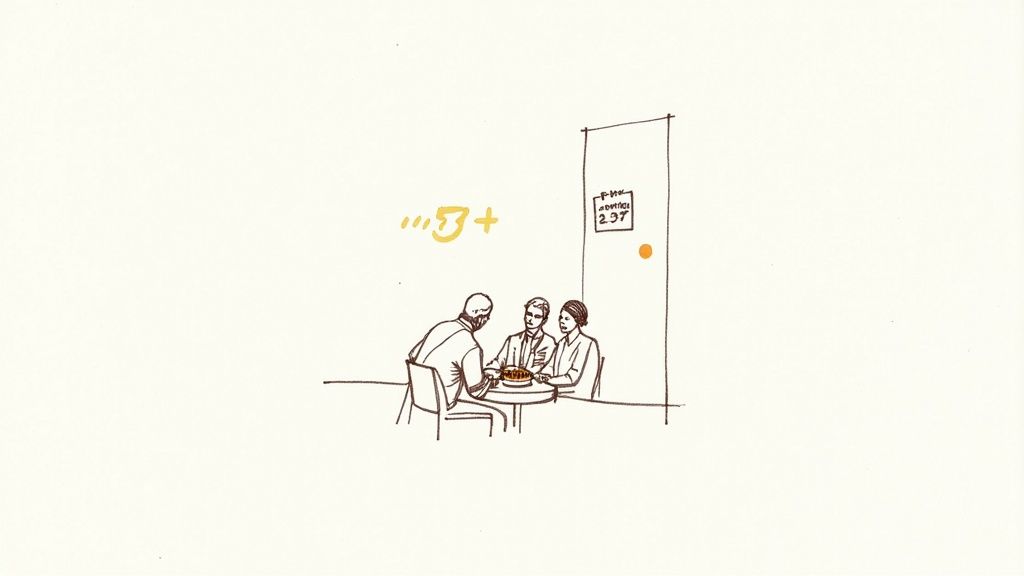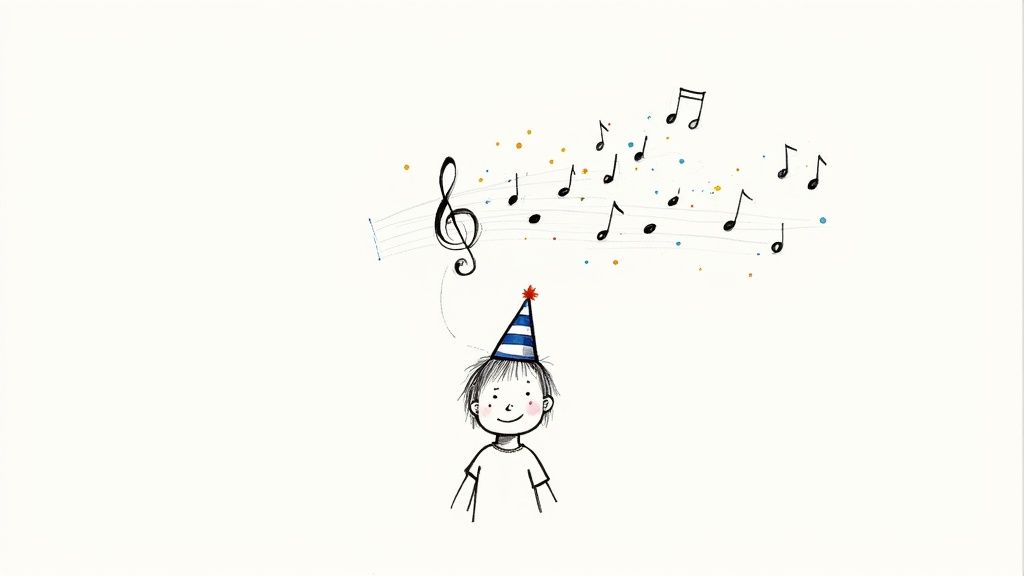Say Happy Birthday in German Like a Pro
If you're looking to wish someone a happy birthday in German, the one phrase you absolutely need to know is Alles Gute zum Geburtstag. It's the classic, all-purpose greeting you'll see on cards, hear at parties, and use in just about any situation. Think of it as your trusty starting point.
Mastering Your First German Birthday Wish
Let's unpack this essential phrase. Breaking it down makes it much easier to remember and say with confidence.
- Alles Gute: This bit means "All the best."
- zum Geburtstag: This translates directly to "for the birthday."
So when you put them together, Alles Gute zum Geburtstag is a warm and friendly way of saying, "All the best for your birthday." It works for everyone—friends, family, and colleagues alike.
To help you get started, here's a quick breakdown of the phrase, its meaning, and a simple pronunciation guide.
Quick Guide to the Main German Birthday Phrase
| German Phrase | Literal English Translation | Simple Pronunciation Guide |
|---|---|---|
| Alles Gute zum Geburtstag | All the best for the birthday | AH-less GOO-teh tsoom Geh-BOORTS-tahg |
A little tip from experience: focus on making the "g" at the end of Geburtstag sound more like a "k". It's a small tweak that instantly makes you sound more like a native speaker.
Of course, just like in English, people often shorten things in casual chats. It's very common to just say or text 'Alles Gute' (All the best), especially with close friends. This shorter version is a safe and friendly option for quick messages on social media or in a text.
In fact, some linguistic research into German social media greetings.
Here's a quick guide to help you choose the right tone.
The Main Thing to Remember: The real difference comes down to the pronouns and the overall feel of the phrase. Informal wishes sound warmer and more personal, while formal ones are all about showing respect and courtesy.
To make things even easier, here's a handy table comparing some common scenarios.
Formal vs Informal Birthday Greetings
Deciding between "du" and "Sie" is the most important step. This table gives you a side-by-side look at how to phrase your birthday wishes based on who you're talking to.
| Situation (Relationship) | Informal Phrase (Using 'du') | Formal Phrase (Using 'Sie') |
|---|---|---|
| Close Friend or Family Member | Alles Liebe zum Geburtstag! | Herzlichen Glückwunsch zum Geburtstag. |
| Colleague You Know Well | Alles Gute zum Geburtstag! | Herzlichen Glückwunsch zum Geburtstag. |
| Your Boss or a Client | Ich wünsche dir alles Gute. | Ich wünsche Ihnen alles Gute. |
| An Elderly Acquaintance | Herzlichen Glückwunsch! | Herzlichen Glückwunsch zum Geburtstag. |
With these examples, you should feel much more confident picking the perfect German birthday greeting for any occasion.
Sounding Natural with More Birthday Phrases
While "Alles Gute zum Geburtstag" is your trusty go-to, having a few extra phrases in your back pocket will make your birthday wishes sound much more genuine and personal. It’s a bit like English; we have more than just one way to say "Happy Birthday," and each one carries a slightly different feeling.
If you want to add a bit more warmth, especially for close friends or family, try "Alles Liebe zum Geburtstag." This translates beautifully to "All the love for your birthday" and immediately adds a layer of affection. Think of it as the German equivalent of saying, "Sending you lots of love on your special day."
Choosing the Right Words
So, how do you pick the perfect phrase? It really boils down to your relationship with the person. This little decision tree makes it super simple to choose the right greeting every time.
As you can see, the main thing to consider is how formal or informal your relationship is. This will guide you to a casual, affectionate phrase for a friend or a more traditional, respectful one for a colleague or acquaintance.
But what if the big day slips your mind? It happens to the best of us!
For a belated birthday wish, the phrase you need is "Nachträglich alles Gute zum Geburtstag." This simply means, "Belated all the best for your birthday." It’s polite, clear, and gets the message across perfectly, even if you’re a day or two late.
Key Takeaway: Switching between phrases like "Alles Liebe" for people you're close to and "Nachträglich" when you've missed the date shows you have a real feel for the language. It makes your greetings feel far more thoughtful and personal.
Of course, the best way to get comfortable with these nuances is to practise. There's no substitute for talking to native speakers. If you’re based here, you might want to check out a language exchange in Singapore to find German speakers for real-world conversation practice.
And for the younger, more casual crowd? You'll definitely see slang like "Happy B-Day!" popping up in texts and on social media. It’s obviously borrowed from English, but it has become a common, super-informal way for friends to send a quick birthday note.
Understanding German Birthday Traditions
Wishing someone a happy birthday in German is about more than just saying the right words. To make your greeting feel genuine and avoid any awkward moments, you need to know a few of the cultural traditions that come with it.
First and foremost, there's a deeply rooted superstition you absolutely must respect: never, ever wish a German a happy birthday before the actual day. It might seem like a thoughtful gesture to send your wishes a bit early, but it’s widely believed to bring bad luck. This isn't just a casual belief; it's a social rule that's taken very seriously.
This custom is so widespread that in German-speaking areas, the celebration only kicks off on the day itself. In fact, over 70% of locals follow the tradition, viewing early wishes as a definite no-go.
The Birthday Person Pays
Here's another custom that often catches outsiders by surprise: in Germany, the birthday person is the one who organises and pays for their own celebration. Forget about friends or family throwing a surprise party.
This means if it’s your birthday, you’re the one who brings a cake to the office for your colleagues or invites your friends out for dinner and drinks. And yes, you pick up the tab. It’s seen as a generous way to share your good fortune with the people you care about.
This tradition really highlights a cultural focus on hospitality and sharing your happiness with your community. For many Germans, planning their own party is also a great way to take charge of their special day and celebrate it exactly how they want.
Of course, knowing the cultural ins and outs is just one part of the equation. If you're planning a party yourself, this essential birthday party planning checklist offers a great step-by-step guide. By keeping these traditions in mind, you can be sure your birthday wishes are both appreciated and perfectly appropriate.
Singing Happy Birthday in German
You can't have a birthday party without a song, and Germany is no exception. While you’ll often hear the classic tune of "Happy Birthday to You," the lyrics get a German makeover that's both simple and charming.
The most common version you'll hear is "Zum Geburtstag viel Glück". It’s sung to that familiar melody, making it incredibly easy for anyone to join in and serenade the guest of honour just before they blow out the candles. It translates literally to "Much luck for your birthday."
The Classic Birthday Song Lyrics
Ready to sing along? The German lyrics fit perfectly with the tune you already know and love:
- Zum Geburtstag viel Glück, (For your birthday, much luck,)
- Zum Geburtstag viel Glück, (For your birthday, much luck,)
- Zum Geburtstag, liebe/lieber [Name], (For your birthday, dear [Name],)
- Zum Geburtstag viel Glück! (For your birthday, much luck!)
Just pay attention to that third line! You’ll want to use liebe for a female and lieber for a male. It’s a small touch, but getting it right shows you've put in the effort to personalise the song. This simple song is just one of many ways to celebrate, much like there are various ways to wish a happy birthday in Spanish.
Traditional German Birthday Songs
But the singing doesn't stop there. Germany has its own collection of beloved birthday songs that bring an authentic, local feel to the celebration, especially for kids. One of the most popular is "Wie schön, dass du geboren bist," which beautifully translates to "How wonderful that you were born."
This song is a truly heartwarming alternative. Instead of just wishing luck, it expresses pure joy that the person exists, which is a lovely sentiment. It’s a staple in schools and family gatherings, deeply woven into German birthday culture.
While the standard "Zum Geburtstag viel Glück" is a safe bet, many Germans prefer their traditional folk songs. In fact, it's estimated that around 60% of birthday celebrations in Germany include at least one unique local song, adding a rich cultural flavour. You can learn more about these German birthday song traditions online, and picking up a few verses is a fantastic way to connect more deeply with the culture.
A Few Lingering Questions About German Birthdays
So, we've covered the main greetings, the classic birthday song, and some fun traditions. But even with all that, a few practical questions might still be bubbling up. Let's tackle some of the most common queries we get so you can navigate any German birthday celebration like a local.
Think of this as your go-to guide for those little details, from writing the perfect card to what to do if the day slips your mind.
How Do I Write a German Birthday Card?
Putting your wishes in writing is a lovely touch, and a German birthday card follows a familiar pattern. With just a few key phrases, you can make it feel genuine and heartfelt.
Kick things off with a warm greeting. You can't go wrong with “Liebe [Name]” for a woman or “Lieber [Name]” for a man. It’s the perfect equivalent of "Dear [Name]."
Next comes the main event: the birthday wish. Use one of the phrases you've learned, like the classic “Alles Gute zum Geburtstag” or the slightly more formal “Herzlichen Glückwunsch zum Geburtstag.” Feel free to add a personal touch, like “Ich wünsche dir einen wunderschönen Tag!” (I wish you a wonderful day!).
To wrap it up, choose a warm closing. Here are a few great options:
- Viele Grüße (Many greetings)
- Herzliche Grüße (Heartfelt greetings)
- Deine/Dein [Your Name] (Yours, [Your Name] — use Deine if you're female, Dein if you're male)
What Happens If I'm Late with My Birthday Wishes?
It happens to the best of us! If you miss the actual day, don't sweat it. The trick is to simply acknowledge you're a bit behind schedule while still sending a sincere message.
The go-to phrase here is “Nachträglich alles Gute zum Geburtstag.” It literally means "Belated all the best for your birthday." This is a polite, standard way to get your wishes across after the fact. You could also add a quick “Entschuldigung für die Verspätung!” (Sorry for the delay!).
A Crucial Cultural Tip: While a late wish is fine, an early one is a big no-no. Remember that strong German superstition about celebrating prematurely? It's a real thing. Always wait until the clock strikes midnight on their birthday, or send your wishes after.
Is It Customary to Bring a Gift to a Party?
Absolutely. If you're invited to a German birthday party, bringing a gift is standard practice. What you bring usually depends on how well you know the person and the vibe of the celebration.
For a relaxed party with friends, you can't go wrong with a good bottle of wine, a beautiful bouquet of flowers, or a nice box of chocolates. If you share a closer friendship, something more personal that ties into their hobbies is always appreciated. It's worth noting that giving cash isn't as common as in some other cultures, unless you're chipping in for a larger group gift or know they're saving up for something specific.
At Spanish Council Singapore, we know that language is so much more than words—it's about connecting with people and their culture. Our native-certified teachers don't just teach you vocabulary; they immerse you in the cultural context so you can communicate confidently and authentically. Ready to start your journey? Discover our engaging Spanish courses for all ages at https://spanish.sg.
















